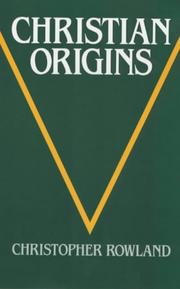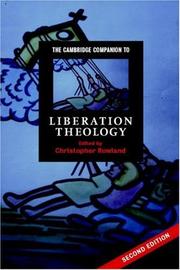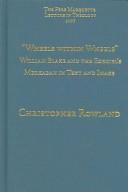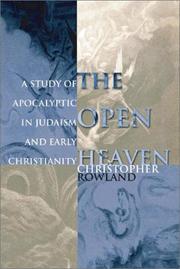| Listing 1 - 10 of 42 | << page >> |
Sort by
|

ISBN: 0521467071 0521461448 9780521461443 9781139000062 9780521467070 Year: 1999 Volume: *2 Publisher: Cambridge Cambridge University press
Abstract | Keywords | Export | Availability | Bookmark
 Loading...
Loading...Choose an application
- Reference Manager
- EndNote
- RefWorks (Direct export to RefWorks)
Bevrijdingstheologie --- Liberation theology --- Libération [Théologie de la ] --- Théologie de la libération --- 241.1*31 --- Liberation theology. --- #GGSB: Dogmatiek --- #GGSB: Bevrijdingstheologie --- Theology of liberation --- Theology, Doctrinal --- Kairos documents --- Philosophy of liberation --- Politieke theologie. Bevrijdingstheologie. Ethiek van de revolutie --- 241.1*31 Politieke theologie. Bevrijdingstheologie. Ethiek van de revolutie --- Théologie de la libération --- Dogmatiek

ISBN: 0281041105 9780281041107 Year: 1985 Publisher: London SPCK
Abstract | Keywords | Export | Availability | Bookmark
 Loading...
Loading...Choose an application
- Reference Manager
- EndNote
- RefWorks (Direct export to RefWorks)
Christianity --- Judaism --- Origin --- History --- Bible. --- Criticism, interpretation, etc --- 281.2 --- 225.08*5 --- -Judaism --- -Jews --- Religions --- Semites --- Jews --- Church history --- Apostolische Kerk. Judeo-christianisme:--tot einde 1ste eeuw --- Theologie van het Nieuwe Testament: messianisme --- -Religion --- Religion --- -Apostolische Kerk. Judeo-christianisme:--tot einde 1ste eeuw --- -281.2 --- 225.08*5 Theologie van het Nieuwe Testament: messianisme --- 281.2 Apostolische Kerk. Judeo-christianisme:--tot einde 1ste eeuw --- -225.08*5 Theologie van het Nieuwe Testament: messianisme --- Hellenistic Judaism --- Judaism, Hellenistic --- Church --- Foundation --- Ba-yon Tipan --- Bagong Tipan --- Jaji ma Hungi --- Kainē Diathēkē --- New Testament --- Nouveau Testament --- Novo Testamento --- Novum Testamentum --- Novyĭ Zavet --- Novyĭ Zavi︠e︡t Gospoda nashego Īisusa Khrista --- Novyĭ Zavit --- Nuevo Testamento --- Nuovo Testamento --- Nye Testamente --- Perjanjian Baru --- Dhamma sacʻ kyamʻʺ --- Injīl --- Criticism, interpretation, etc. --- Christianity - Origin --- Judaism - History - Post-exilic period, 586 B.C.-210 A.D
Book
ISBN: 0281037841 9780281037841 Year: 1982 Publisher: London SPCK
Abstract | Keywords | Export | Availability | Bookmark
 Loading...
Loading...Choose an application
- Reference Manager
- EndNote
- RefWorks (Direct export to RefWorks)
Book
ISBN: 9783161597862 9783161597879 3161597869 3161597877 Year: 2022 Publisher: Tübingen Mohr Siebeck
Abstract | Keywords | Export | Availability | Bookmark
 Loading...
Loading...Choose an application
- Reference Manager
- EndNote
- RefWorks (Direct export to RefWorks)
"This volume of essays by Christopher Rowland concerns the nature of apocalypticism and its reception history. While the eschatological character predominates in modern biblical scholarship, the author argues for a focus rather on the revelatory form of apocalyptic texts. A consistent thread throughout the volume is the pervasiveness of apocalyptic and mystical elements in the New Testament and the reception of these ideas, culminating in the apocalyptic texts and images of William Blake." The contents of this volume of essays by Christopher Rowland concern the nature of apocalypticism and its reception history. The opening word of Revelation as an apocalypse - in ohter words, a writing whose form is revelatory -, is key to the essays in this book. It contrasts with the eschatological character of »apocalyptic« which predominates in modern biblical scholarship. The pervasiveness of apocalyptic and mystical elements in the New Testament is a consisten thread through the volume, which also includes consideration of the apocalyptic and eschatological thought of Joachimof Fiore and his disciples, the early modern appeal to visions and revelation, and culminates in the texts and images of William Blake (1757-1827). The collection's concern with the history of the reception of such ideas contributes to the bvindication of Ernst Käsemann's view of apocalyptic being the »mother of Christian theology.«

ISBN: 9780521688932 9780521868839 9781139001755 Year: 2007 Publisher: Cambridge Cambridge University Press
Abstract | Keywords | Export | Availability | Bookmark
 Loading...
Loading...Choose an application
- Reference Manager
- EndNote
- RefWorks (Direct export to RefWorks)

ISBN: 0874624983 0874625874 1435610717 Year: 2007 Publisher: Marquette University Press
Abstract | Keywords | Export | Availability | Bookmark
 Loading...
Loading...Choose an application
- Reference Manager
- EndNote
- RefWorks (Direct export to RefWorks)

ISBN: 1592440126 Year: 2002 Publisher: Eugene, Or. : Wipf and Stock,
Abstract | Keywords | Export | Availability | Bookmark
 Loading...
Loading...Choose an application
- Reference Manager
- EndNote
- RefWorks (Direct export to RefWorks)
Apocalyptic literature. --- Rabbinical literature --- Littérature apocalyptique --- Littérature rabbinique --- History and criticism. --- Histoire et critique
Book
ISBN: 9781784532659 1784532657 9781786722386 9781786732385 Year: 2017 Publisher: London I.B. Tauris
Abstract | Keywords | Export | Availability | Bookmark
 Loading...
Loading...Choose an application
- Reference Manager
- EndNote
- RefWorks (Direct export to RefWorks)
Christianity began with the conviction that the old order was finished. The mysterious, elusive and charismatic figure of Jesus proclaimed that a new era, the Kingdom of God, was dawning. Yet despite its success, and the conversion of the empire which had executed its founder, the religion he inspired was soon domesticated, its counter-cultural radicalism tamed, as the Church attempted to control both its doctrines and its followers. Christopher Rowland here shows that this was never the whole story. At the margins, around the edges, sometimes off the religious map, the apocalyptic flame of the New Testament continued to burn. In 1649 the Diggers occupied St George's Hill to put the egalitarianism of Christ into practice. 'You must break these men or they will break you', Oliver Cromwell declared of the 'lunaticks'. This book argues that such revolutionaries had divined the true intent of the enigma who threw over the tables of the money-changers: to summon a new epoch - strange, iconoclastic, uncomfortable and otherworldly. It gives full weight to a remarkable strain of radical religion that simply refuses to die.

ISBN: 9780874625875 Year: 2007 Publisher: Milwaukee Marquette university press
Abstract | Keywords | Export | Availability | Bookmark
 Loading...
Loading...Choose an application
- Reference Manager
- EndNote
- RefWorks (Direct export to RefWorks)
Cabala in literature --- Merkava --- Myth in literature --- Prophecies in literature --- Theology in literature --- Blake, William, --- Criticism and interpretation. --- Religion. --- Bible. --- Biblia --- Criticism, interpretation, etc. --- In literature.
Book
ISBN: 0745601979 Year: 1988 Publisher: Cambridge Polity press
Abstract | Keywords | Export | Availability | Bookmark
 Loading...
Loading...Choose an application
- Reference Manager
- EndNote
- RefWorks (Direct export to RefWorks)
| Listing 1 - 10 of 42 | << page >> |
Sort by
|

 Search
Search Feedback
Feedback About UniCat
About UniCat  Help
Help News
News